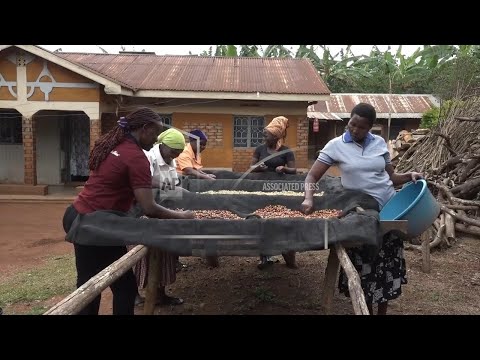(10 May 2025)
ASSOCIATED PRESS
Sironko, Eastern Uganda – 15 March 2025
1. Drone shot of coffee farms in Sironko, Eastern Uganda +MUTE+
2. Various of coffee plants
3. Various of women harvesting coffee
4. Tilt down of woman putting berries in a bowl
5. Close of coffee berries in a basin
6. Women picking berries
7. Women carrying basins of berries
8. SOUNDBITE (English) Meridah Nandudu, founder, Bayaaya Specialty Coffee
“Initially, women had been so discouraged about coffee in a way that when you look at coffee value chain, it’s the women who do the donkey work. It is the women that are planting, when it comes to weeding, harvesting, pulping, fermentation, washing and our fathers come at the point when this coffee is ready for selling.”
9. Various of Meridah and other women spreading and sorting coffee berries
10. SOUNDBITE (English) Juliet Kwaga, coffee farmer
“A lot of things have changed. I can talk about my story, when I grew up by then mum was not participating in this coffee things, her work was only to be at home as you know those are those days, but now these days things have changed because of sensitizing. We receive a lot of people who come talk to us, talk to families and in that process, we have seen a lot of changes, changes in families.”
ASSOCIATED PRESS
Mbale, Eastern Uganda – 15 March 2025
11. Wide of workers at a coffee collection point
12. Close of bag being cut open to release coffee beans
13. Various of Meridah checking the coffee quality
14. Sacks of coffee being loaded onto a truck
ASSOCIATED PRESS
Sironko, Eastern Uganda – 15 March 2025
15. SOUNDBITE (English) Meridah Nandudu, founder, Bayaaya Specialty Coffee
“We came up with an idea where a woman’s coffee was fetching a slightly higher price than that one of a man. It was particularly 200 shillings, if a woman delivered coffee, it would earn that family 200 shillings plus on a kilo, so that motivated the men to trust their women to sell the coffee. So, when the women sell the coffee, she has a hand in it, she knows how much we have sold this coffee, and when they come back at home they are able to sit and are able to discuss. So, through this we have witnessed low reduction levels of gender based violence in our communities and then the women have been empowered.”
ASSOCIATED PRESS
Mbale, Eastern Uganda – 14 March 2025
16. Various of a woman unpacking screens in the coffee testing laboratory
17. Various of beans being weighed
18. Various of women smelling and checking roasting coffee
ASSOCIATED PRESS
Sironko, Eastern Uganda – 15 March 2025
19. SOUNDBITE (English) Meridah Nandudu, founder, Bayaaya Specialty Coffee
“It is important for us as women to be engaged in the coffee value chain. One is, as we all know traditionally we woman are like caretakers, we are managers it’s us basically to manage whatever activities are happening at home, always our husbands are always not at home so we are the ones that go to the farm, we are planting, we are the ones that are doing the weeding, we harvest the coffee with our children, we are able to pulp this coffee, and then we are able to ferment, we are washing the coffee so we are providing a support system to our husbands – so a woman is very important in the coffee value chain.”
20. Close of coffee plant
21. Various of women harvesting the coffee beans
22. Close of beans on the plant
23. SOUNDBITE (English) Juliet Kwaga, coffee farmer
ASSOCIATED PRESS
Mbale, Eastern Uganda – 14 March 2025
24. Various of a barrista preparing coffee
STORYLINE:
LEADIN:
STORYLINE:
Find out more about AP Archive: http://www.aparchive.com/HowWeWork
Twitter: https://twitter.com/AP_Archive
Facebook: https://www.facebook.com/APArchives
Instagram: https://www.instagram.com/APNews/
You can license this story through AP Archive: http://www.aparchive.com/metadata/youtube/e421fe8baffb4085a7cb58409159b348
Author: AP Archive
Go to Source
News post in May 15, 2025, 6:04 am.
Visit Our Sponsor’s:
News Post In – News





